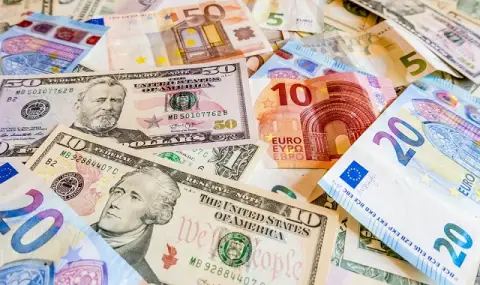The euro has appreciated significantly above parity with the US dollar since its exchange rate reached its lowest level in September 2022. Since Donald Trump's re-election as US president in early November, however, the US currency has regained strength and, according to experts, in the new year, 2025, it is possible to equalize with the euro again, according to the German financial publication "Finanzen", quoted by bTA.
Thanks to the "red wave" in the US, where in addition to the presidency in the person of Trump, the Republicans also secured a majority in Congress, the dollar index, which takes into account the value against a basket of other currencies, climbed to its highest level in a year. This is related to Trump's announced intentions for new tariffs and tax cuts, which are likely to increase inflation in the world's largest economy, and then the Federal Reserve (Fed) is likely to act more cautiously in lowering interest rates. Higher interest rates usually support a currency.
For these reasons, many experts expect the US currency to strengthen further, writes CNBC.
"The euro suffered more than most other major currencies in Trump's election victory, and we doubt that will change in the foreseeable future," said James Riley, chief economist at "Capital Economics". He predicts that parity of the euro against the dollar will be reached by the end of 2025. While the FED is taking a slower approach to lowering its interest rates, given the "economic shocks caused by weakening exports" The ECB could ease its monetary policy further, Riley said.
He is not alone in this view. Economists at Barclays and Goldman Sachs predict that parity could occur with 10 percent U.S. tariffs on European goods and subsequent retaliation.
The ECB's chief economist, Philip Lane, expects another rate cut. He has already advocated stimulating the European economy by cutting interest rates again. Given the possibility of new U.S. tariffs, he said in an interview with the French newspaper Eco said the extent of the problem would depend on "how widespread protectionism is and how quickly the appropriate measures are imposed".
While the dollar has been boosted by Trump's re-election, the euro has been under pressure from the escalation of the war in Ukraine. Russia, in response to the use of long-range US missiles by Ukrainian forces on Russian territory, has changed its nuclear doctrine, thereby lowering the threshold for the use of nuclear weapons. Given this development, demand for safe-haven currencies is growing, which is supporting the dollar, said Jane Foley, head of currency strategy at "Rabobank".
If tensions related to the war in Ukraine continue, it has the potential to accelerate the dollar's approach to parity with the euro, Foley said.
